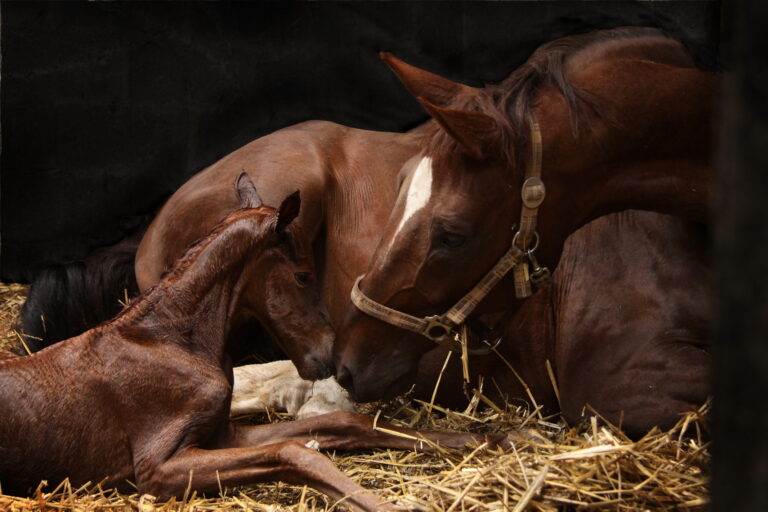
Q: What is equine influenza?
A: Equine influenza virus (EIV) is one of the most common and contagious infectious upper respiratory diseases in the horse. Equine influenza is caused by a highly variable strain of the influenza , which is endemic in horses and other equus species. It spreads rapidly with clinical signs appearing within 24 to 48 hours following exposure, and it can be transmitted more than 200 yards through the air by a coughing horse.
In an unvaccinated horse population that has never been exposed to the virus, EIV has a nearly 100 percent infection rate.
Historically, flu outbreaks have caused significant economic loss and made a devastating impact on the horse industry. Today, flu continues to be a substantial international threat.
Q: Why are equine influenza vaccines updated periodically?
A: Influenza viruses are constantly changing at the molecular level as they pass from one host to another. This process of minor evolutionary mutations and alterations, known as antigenic drift, leads to new virus strains that a horse’s immune system doesn’t recognize.
Due to the changes that can occur with EIV, it is paramount to update vaccines to keep up with these antigenic changes. This helps ensure that vaccine strains provide relevant protection against influenza viruses currently circulating in our equine populations.
Q: What is antigenic drift? Is it specific to equine influenza?
A: Antigenic drift is a term used to describe how the influenza virus changes and mutates over time, making it look different to the immune system. It is not specific to equine influenza—the same phenomenon occurs with influenza viruses affecting other species, including humans.
Q: What is a clade?
A: Clade is a common phylogenetic term used when referring to evolutionary or ancestral trees—defined as a group of organisms that consists of a common ancestor. In the case of equine influenza, clade is used to describe recently isolated viruses (or strains) of equine influenza that belong to the same family—or sublineage—but have antigenic differences.
All recently isolated influenza viruses (or strains) in North America and Europe belong to the Florida clades 1 and 2 sublineages, respectively. Clade 1 primarily circulates in the United States, while clade 2 predominantly circulates in Europe.
Q: Who is OIE?
A: Office International des Epizooties is the World Organisation for Animal Health—commonly abbreviated as OIE. The OIE Expert Surveillance Panel on Equine Influenza is responsible for monitoring equine influenza and providing recommendations on vaccine strains.
Q: Why do horses need clade 1 and clade 2 influenza protection?
A: The World Organisation for Animal Health (OIE) Expert Surveillance Panel on Equine Influenza currently recommends that vaccines contain both clade 1 and clade 2 viruses of the Florida sublineage. Clade 1 primarily circulates in the United States, while clade 2 predominantly circulates in Europe. Although there have been no clade 2 influenza outbreaks in the U.S., clade 2 protection is considered an additional safeguard for the many horses that travel internationally.
Q: Have there been any clade 2 equine influenza outbreaks in the U.S.?
A: No. While there have been no reported outbreaks of equine influenza from clade 2 infected horses in the U.S., we suspect it might just be a matter of time as we see more international movement in our equine populations.
Q: Why did Merck Animal Health choose the “Florida ‘13” strain for its updated vaccines?
A: Florida ‘13 represents a current, clinically significant strain of equine influenza that was responsible for a large influenza outbreak in well-vaccinated horses. In February 2013, the annual Ocala Horse Shows in the Sun (HITS) international event experienced a large outbreak of equine herpesvirus type 1 and equine influenza that impacted hundreds of horses. The highly pathogenic strain of influenza that impacted these horses was ultimately isolated and identified as Florida ‘13 through the Merck Animal Health Respiratory Biosurveillance Program, and it is now part of our killed line of equine influenza vaccines. Florida ‘13 is a clade 1 influenza strain.
Q: What is the Merck Animal Health Biosurveillance Program?
A: Since 2008, Merck Animal Health, in collaboration with the University of California, Davis, School of Veterinary Medicine (UC Davis), has been conducting an ongoing, voluntary equine biosurveillance program to study the prevalence and epidemiology of relevant viral and bacterial respiratory pathogens. As of October 2017, more than 7,000 samples from U.S. horses have been collected since the program began.
Submitted samples are tested for six infectious upper respiratory disease pathogens, including equine herspesvirus types 1 and 4, equine influenza virus, S. equi subspecies equi (strangles) and equine rhinitis A/B viruses. It was through this program that the new Florida ‘13 strain of influenza was identified and isolated.
Q: What influenza strains are included in Merck Animal Health’s Prestige vaccines?
A: Merck Animal Health influenza-containing killed virus vaccines include Florida ‘13, Richmond ‘07 and Kentucky ‘02 strains. Florida ‘13 and Richmond ‘07 are new strains that were added to the existing Kentucky ‘02 strain. With these strains, Merck Animal Health is providing protection against currently circulating equine influenza strains, as recommended by the OIE.
Q: Which Merck Animal Health vaccines contain updated influenza strains?
A: All Merck Animal Health Prestige influenza-containing killed-virus vaccines will include the updated influenza strains.
Q: Are certain horses more susceptible to equine influenza than others?
A: Yes. Horses that travel are particularly susceptible to influenza. This is because their immune system might be compromised due to the stress of travel, as well as the increased exposure to other horses and environments.
Outbreaks of influenza most frequently occur when susceptible horses are transported to racetracks, showgrounds and sales, and then are housed in close quarters.
In addition, horses that rarely travel should also be vaccinated against influenza if they are exposed to traveling horses.








